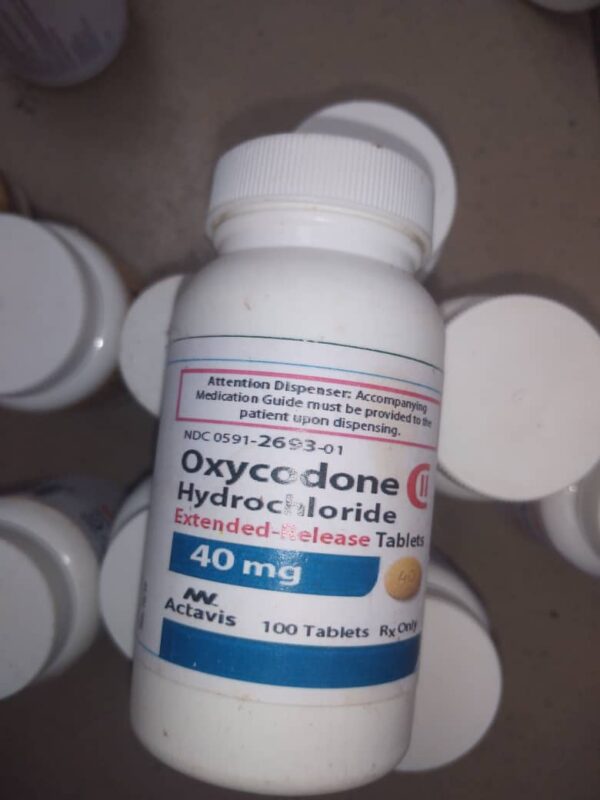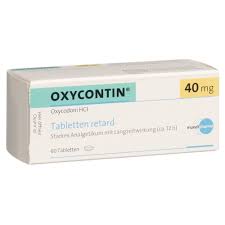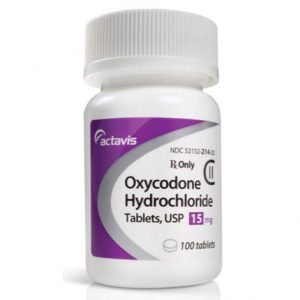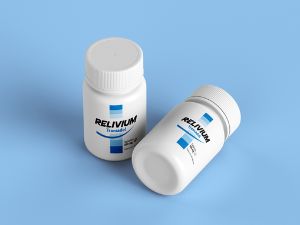Oxycodone 40mg
Oxycodone 40mg hydrochloride (Oxycontin) is an opioid pain medication, sometimes called a narcotic. It is used to treat moderate to severe pain. OxyContin extended-release tablets are used for around-the-clock treatment of pain. They are not for use on an as-needed basis for pain.
Important Information
You should not use Oxycodone if you have severe asthma or breathing problems, or a blockage in your stomach or intestines.
Oxycodone can slow or stop your breathing, and may be habit-forming. MISUSE OF THIS MEDICINE CAN CAUSE ADDICTION, OVERDOSE, OR DEATH, especially in a child or other person using the medicine without a prescription.
Taking Oxycodone during pregnancy may cause life-threatening withdrawal symptoms in the newborn.
Fatal side effects can occur if you use Oxycodone with alcohol, or with other drugs that cause drowsiness or slow your breathing.
Before taking this medicine
You should not use Oxycodone if you are allergic to oxycodone, or if you have:
- severe asthma or breathing problems; or
- a blockage in your stomach or intestines.
You should not use Oxycodone unless you are already using a similar opioid medicine and are tolerant to it.
Oxycodone should not be given to a child younger than 11 years old.
To make sure this medicine is safe for you, tell your doctor if you have ever had:
- a head injury, brain tumor, or seizures;
- drug or alcohol addiction, or mental illness;
- liver or kidney disease;
- urination problems; or
- problems with your gallbladder, pancreas, or thyroid.
Some medicines can interact with oxycodone and cause a serious condition called serotonin syndrome. Be sure your doctor knows if you also take stimulant medicine, herbal products, or medicine for depression, mental illness, Parkinson’s disease, migraine headaches, serious infections, or prevention of nausea and vomiting. Ask your doctor before making any changes in how or when you take your medications.
If you use Oxycodone while you are pregnant, your baby could become dependent on the drug. This can cause life-threatening withdrawal symptoms in the baby after it is born. Babies born dependent on habit-forming medicine may need medical treatment for several weeks.
Do not breast-feed. Oxycodone can pass into breast milk and may cause drowsiness, breathing problems, or death in a nursing baby.
How should I use Oxycodone?
Oxycodone can slow or stop your breathing, especially when you start using this medicine or whenever your dose is changed. Never take Oxycodone in larger amounts, or for longer than prescribed. Tell your doctor if the medicine seems to stop working as well in relieving your pain.
Side Effects
Get emergency medical help if you have signs of an allergic reaction to Oxycodone: hives; difficult breathing; swelling of your face, lips, tongue, or throat.
Like other narcotic medicines, oxycodone can slow your breathing. Death may occur if breathing becomes too weak. A person caring for you should seek emergency medical attention if you have slow breathing with long pauses, blue colored lips, or if you are hard to wake up.
Call your doctor at once if you have:
- noisy breathing, sighing, shallow breathing;
- a slow heart rate or weak pulse;
- a light-headed feeling, like you might pass out;
- confusion, unusual thoughts or behavior;
- seizure (convulsions);
- severe constipation; or
- low cortisol levels – nausea, vomiting, loss of appetite, dizziness, worsening tiredness or weakness.






Reviews
There are no reviews yet.